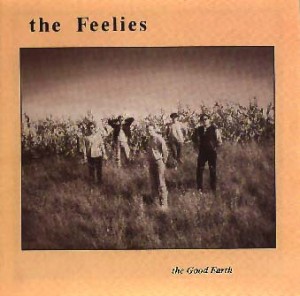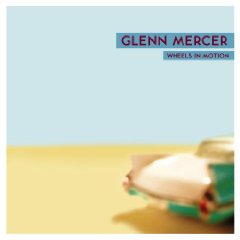Marking their latest unexpected comeback twenty years after their fourth studio album, the Feelies are like a cat with nine lives.
Originally from Haledon, the Velvet Underground-nurtured outfit, led by singer-guitarists Glenn Mercer and Bill Million, scored instant left-of-the-dial radio success with 1980’s soft rock masterstroke, Crazy Rhythms. Prefiguring the unaffected do-it-yourself lo-fi bedroom recordings that’d pop up in the early ‘90s, Mercer’s understated half-sung baritone, barely audible in the mix, juxtaposed delicately droned six-string dribbles and primal tribal beats in an inconspicuously subtle manner.
Like sipping tea listening to Belle & Sebastian on an autumnal Sunday morning or attending an early evening wine and cheese party absorbing the sun admiring Rubber Soul, the Feelies are enduringly pleasant on the ears, mind, and body. You could place ‘em alongside easy listening soft rock legends Crosby Stills Nash & Young, Loggins & Messina, or any other decent ‘70s femme pop luminary and they’d come out smelling like roses. The world outside may be in flux, but these northern Jersey natives have remained the same – even if long layoffs dulled the momentum.
This time around, Mercer got the chance to reconvene with his seasoned partners following a high-prized low profile solo entrée, ‘08s World In Motion. So all of a sudden on a wing and a prayer he’s back in stride with Million, a transplanted Floridian, plus bassist Brenda Sauter, drummer Stanley Demeski, and percussionist Dave Weckerman (snares/ floor toms/ sleigh bells/ tambourine). The planets must’ve aligned ‘cause a few desirable circumstances were necessary for the latest Feelies reunion to occur.
It turns out Million’s Princeton-based son had been casually jamming with Mercer around the time Turner Broadcasting Network wanted to use Mercer-Million song, “Decide,” for promotion, developing a line of communication for the co-composing duo. Furthermore, faithful Feelies followers Sonic Youth sought out the enigmatic combo for a Fourth of July Battery Park show a few years back. Combined with high internet demand for early recordings and several requests to play live, the Feelies returned to form on 2011’s refreshing re-entry, Here Before.
Getting lasting mileage out of the basic guitar-bass-drums setup, these resilient rockers have endured way past their modest incipient Jersey genesis. Whereas Crazy Rhythms received inspiration from a positively decadent late-‘70s New York scene that nearly died on the vine, belated ’86 follow-up, The Good Earth, a more uniform set, captured a demure bucolic rusticity. Invigorated by a cross-country tour where they coveted post-punk denizens such as REM (whose Peter Buck co-produced The Good Earth), Meat Puppets, Minutemen, and Replacements, the Feelies expanded slightly outward.
“We wanted to distance ourselves from punk. Growing up, we listened to the Stooges and Velvet Underground, so we’d seen it done better before,” Mercer claims. “But the CBGB’s scene wasn’t all strictly punk. Talking Heads, Modern lovers, and Television had punk elements, but weren’t safety-pinned leather-jacketed types. The whole punk scene, to us, was a little stale at that point.”
Incidentally, the dual guitar lattice of Television’s Richard Lloyd and Tom Verlaine had a profound affect on Mercer and Million’s less aggressive, more anesthetized fretwork.
“I saw Television early on at their first or second show at the Hotel Diplomat in Times Square. This was before CBGB’s. I saw Kiss there at probably their first Manhattan date. It was a small ballroom, not a rock venue. Dave and I were in a pre-Feelies band, the Outkids, around that time doing British Invasion covers, garage rock, and psychedelia. We may’ve done some demos.”
Utilizing sleeker textural designs and a rockier Power Station production, ‘88s Only Life attempted to land the Feelies on MTV’s newly christened alternative program, 120 Minutes, alongside fellow subterranean minions looking for a big break. Yet ‘91s confoundedly overlooked Time For A Witness, arguably the bands’ strongest set, suffered due to A & M Records untimely merger, limited publicity sources, and pressure to get to the next level of monetary prosperity.
Still, through it all, the Feelies steadfastly maintained the same charmingly understated pastoral serenity and naïve Jonathan Richman-clipped whimsicality of yore, standing clear of gimmicky propensities while gradually gaining surreptitious prominence amongst indie elitists and attentive egalitarians.
Back in the game once again, the Feelies lengthily intermittent legacy continues to sprout fertile seedlings. And the ambitiously apropos undertaking, Here Before, seals the deal. Though the approach is undeniably similar, their assuredness, determination, and discriminating musical sensibilities have definitely evolved slowly over time.
Showing no signs of wear and tear, the gallant troupe habitually relies on gentle melancholic mementos to counter louder uplifting fare. The cheerful jangled spritz and rubbery bass lope consuming “Nobody Knows” fittingly contrasts gently strummed dispatch “Should Be Gone.” Then, gray skies cloud the politely sublime auspices of “Again Today,” where presciently angular Neil Young-like shredding reinforces the cryptically caliginous mood. A tiny patch of sun shines across the mild psychedelic scamper and unbridled enthusiasm guiding “When You Know,” lighting up the wispy percussive-knocked tenderness branding “Later On” as well.
“We spent some time sequencing it to give it a good flow,” Mercer ascertains. “We don’t put out a lot of records, so when we do, we put in a lot of effort. Vocal parts sometimes provide direction, but mostly the songs start with guitar, then melody and lyrics. It’s all pretty effortless. It comes naturally, even more so now that we’ve played together so long. Usually, we do nine new songs and a cover, but this album had 13 songs so we varied the tone, tempo, and texture more.”
Never a big record collector, Mercer concentrates on songwriting and doesn’t spend time tracking current trends. However, he enjoyed the ‘mellow chill music’ of local Jersey band, Real Estate, enough to place them as the Feelies openers for the few dates they’ll play supporting Here Before.
Asked if his band would ever change its schematic, Mercer suggests, “Normally, I’d say I didn’t know, but I’ve been recording some instrumental stuff reminiscent of the Willies, a band I had between the first and second Feelies lineups that didn’t release anything. As for the Feelies, our chemistry’s improved and we each have our own unique approach to the instruments we play. Our individual styles have become refined, resulting in a comfort zone that lets us fall into the groove pretty easily. Also, as you go through life, you have more life experiences to draw upon.”
Hardly taking a backseat to his long-time lead singing pal, Bill Million may not be the focal point, but he’s the glue that binds the quelling quintet. His primary formative influences include the Beatles, Rolling Stones, MC5, Stooges, and of course, Velvet Underground.
 “We used to joke about only redoing Crazy Rhythms’ nine songs and make a career out of it,” Million chuckles. “Initially, we approached music like minimalists. After some time off, it’s like Tom Verlaine used to say, ‘My senses are sharp, but my hands are like gloves.’ I interpret that to mean you have the thought process in place, but need to redevelop the physical attributes.”
“We used to joke about only redoing Crazy Rhythms’ nine songs and make a career out of it,” Million chuckles. “Initially, we approached music like minimalists. After some time off, it’s like Tom Verlaine used to say, ‘My senses are sharp, but my hands are like gloves.’ I interpret that to mean you have the thought process in place, but need to redevelop the physical attributes.”
Putting music aside to take care of family obligations, Million’s recent re-acquaintance with his old mates just felt right from the start. Complementing Mercer’s extraordinary leads with efficient chord progressions, he’s always fine tuning nifty guitar licks.
“We’ve retained the same basic premise, but keep working on it. The entire band is very comfortable listening closely to each other when we play. For “Later On,” Glenn’s doing these arpeggiated harmonics and Brenda comes out from right underneath him with similar bass notes,” he relates.
Touring with Mike Watt’s post-Minutemen trio, Firehose, during the late ‘80s, and Hoboken legends Yo La Tengo soon after, the Feelies and these worthy peers never reached aboveground access, but Million realizes contemporary radio and indie acclaim have been worlds apart since punk broke through the cellar door in ’77.
“Even Rolling Stone, the premier music paper, now does a mere two paragraphs devoted to cool bands, but put Taylor Swift, Justin Bieber, and Rhianna on the cover. They used to write poignantly about Jimi Hendrix and John Lennon. It’s a giant change and most bands don’t have a connection to that,” explains Million. “When I grew up, AM radio played the Beatles and Stones. But our bands’ content to be where we are. We have no interest in major labels. We’ve established an extended family with Bar/None Records. I don’t envy anyone who wants to go down the road to a major label deal with what goes on.”
Flying in the face of Lowest Common Denominator commercial airplay, the combative “Time Is Right” could be seen as a snippy snub serving notice to handcuffed mainstream discjockeys. On the positive tip, the Feelies have a large contingent of renegade fans in the northeast, Australia, Japan, and Europe. They’ve been offered tour dates overseas and on the West Coast, but seem averse to flying.
“We’ll keep honing our craft and probably won’t make any dramatic shifts. We just wanna improve upon our own musical direction,” concludes Million.



